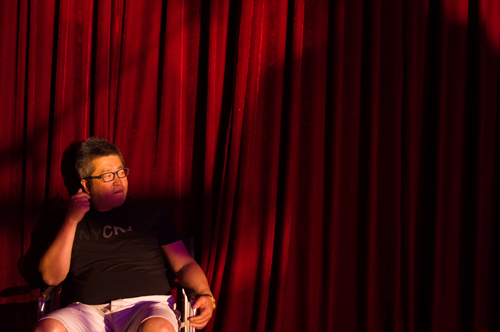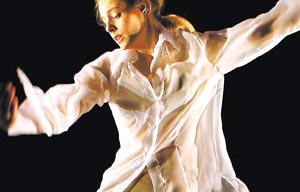When music needs drama
Updated: 2012-08-31 09:25
By Chen Nan (China Daily)
|
||||||||
 |
|
Drama has changed Xiao Ke's attitude toward music/provided to China Daily |
Established singer-songwriter Xiao Ke is serious about his involvement in performing arts and has recently opened his own theater in Beijing. Chen Nan reports.
Singer-songwriter Xiao Ke made a deal with himself five years ago: he would perform at his own theater some day.
He realized his dream in April, when he launched Xiao Ke Theater inside Beijing's 798 art district, facing the iconic railway and old train.
At the opening ceremony of the theater, Xiao Ge said: "I am over 40 and have a sense of responsibility growing unconsciously in my heart. I hope that I can be a model of contemporary Chinese performing arts."
What prompted the songwriter behind popular songs like Beijing Welcomes You, a song for the 100-day countdown of the 2008 Beijing Olympics, decide to try his hand at theater?
Xiao Ke says it is because he has had a smooth music career since he started out in 1995, and that had made him indifferent. For someone who has been exposed to music since he was young, Xiao Ke says he has somehow lost his curiosity for it.
"I know it (music) too well, and my musical vision became narrow and subjective," he says. "I wasn't really listening to myself and thinking about the kinds of projects I wanted to do. I had to figure out what kind of songwriter I wanted to be."
His first involvement in theater was in 2007 when he was invited to write the score and sing in the musical drama, How Much Love Can Be Messed Up.
With encouragement from the director, Xiao Ke ended up playing the lead role of Lin Yibai, a heartbroken 30-something bachelor.
The drama turned out to be a huge success, and that made Xiao Ke a big fan of theater. The experience helped him regain new excitement for music and the performing arts. How Much Love Can Be Messed Up is still being staged, five years after its debut.
During the past five years, he has also tried directing and producing his own dramas, such as Whereby I Love You and Because of Love, which have transformed him from a man who knew only music and nothing about theater, to someone who is obsessed with theater.
Xiao Ke, whose real name is Ke Zhaolei, started as a campus folk singer and slowly developed his talent for songwriting. He has released five albums since 1995 and written chart-toppers for pop stars from Hong Kong, Taiwan and the mainland.
The experience with drama changed his attitude toward music and even his personality. "Musicals, opera and drama are art forms from the West. I can't help but wonder about the DNA of China's theater. I want to let more people share my feelings about theater, and so, I opened my own theater," he adds.
To him, the theater also takes music back to its original state. "When there is no CD, no radio or television, the only option to listen to music is to watch live performances," Xiao Ke says.
Recently, he performed for the first time at Xiao Ke Theater. Together with four other veteran musicians from Taiwan, including Yuan Wei-jen and Panda Hsiung, Xiao Ke performed a concert titled Influence, where they took audiences a decade back to the height of the performers' music careers.
"It feels so good to have such an intimate place to sing and play guitar for you guys," said Yuan Wei-jen, who has been a long-time friend of Xiao Ke, at the show in Xiao Ke Theater. "This is my debut performance in Beijing and I am happy to be here."
The theater, with a capacity of about 200 people, has a restaurant and a cafe on the first floor and a small venue on the second floor. The venue allows audiences to enjoy music and feel closer to the performers. According to Xiao Ke, he wants his theater to be like a bookstore or a supermarket, which is a necessary part of life.

So far the theater has held four shows, including drama, musical and experimental theater combining Peking Opera and shadow play with contemporary music. Xiao Ke has also invited his friends, such as famous singers Cheng Fangyuan and Lao Lang, to perform live shows.
"Theater is not my major but I feel grateful to theater, which enlightens me," says Xiao Ke.
He admits that setting up a theater is to fulfill his personal dream, but the commercial risk is high.
"I am not sure about the future of my theater. I just do what I want for now," he says. "My focus is still on music, and theater paves a new way to present my music."
Contact the writer at chennan@chinadaily.com.cn.











